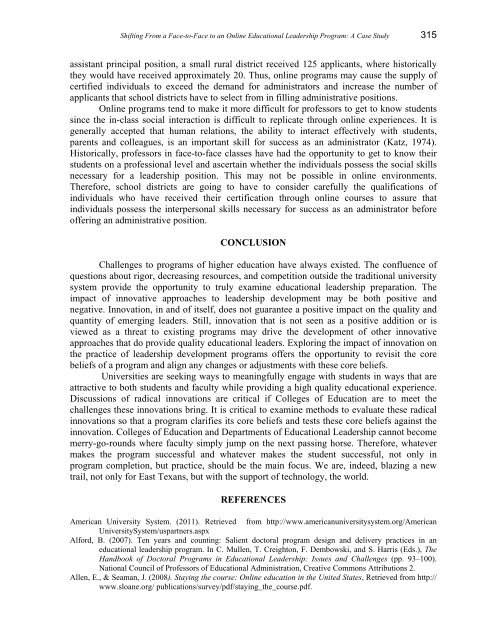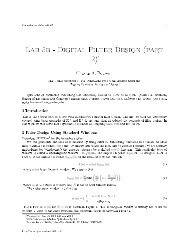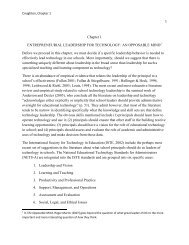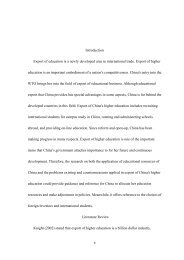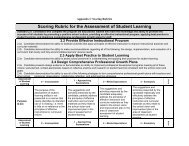Blazing New Trails - Connexions
Blazing New Trails - Connexions
Blazing New Trails - Connexions
You also want an ePaper? Increase the reach of your titles
YUMPU automatically turns print PDFs into web optimized ePapers that Google loves.
Shifting From a Face-to-Face to an Online Educational Leadership Program: A Case Study 315<br />
assistant principal position, a small rural district received 125 applicants, where historically<br />
they would have received approximately 20. Thus, online programs may cause the supply of<br />
certified individuals to exceed the demand for administrators and increase the number of<br />
applicants that school districts have to select from in filling administrative positions.<br />
Online programs tend to make it more difficult for professors to get to know students<br />
since the in-class social interaction is difficult to replicate through online experiences. It is<br />
generally accepted that human relations, the ability to interact effectively with students,<br />
parents and colleagues, is an important skill for success as an administrator (Katz, 1974).<br />
Historically, professors in face-to-face classes have had the opportunity to get to know their<br />
students on a professional level and ascertain whether the individuals possess the social skills<br />
necessary for a leadership position. This may not be possible in online environments.<br />
Therefore, school districts are going to have to consider carefully the qualifications of<br />
individuals who have received their certification through online courses to assure that<br />
individuals possess the interpersonal skills necessary for success as an administrator before<br />
offering an administrative position.<br />
CONCLUSION<br />
Challenges to programs of higher education have always existed. The confluence of<br />
questions about rigor, decreasing resources, and competition outside the traditional university<br />
system provide the opportunity to truly examine educational leadership preparation. The<br />
impact of innovative approaches to leadership development may be both positive and<br />
negative. Innovation, in and of itself, does not guarantee a positive impact on the quality and<br />
quantity of emerging leaders. Still, innovation that is not seen as a positive addition or is<br />
viewed as a threat to existing programs may drive the development of other innovative<br />
approaches that do provide quality educational leaders. Exploring the impact of innovation on<br />
the practice of leadership development programs offers the opportunity to revisit the core<br />
beliefs of a program and align any changes or adjustments with these core beliefs.<br />
Universities are seeking ways to meaningfully engage with students in ways that are<br />
attractive to both students and faculty while providing a high quality educational experience.<br />
Discussions of radical innovations are critical if Colleges of Education are to meet the<br />
challenges these innovations bring. It is critical to examine methods to evaluate these radical<br />
innovations so that a program clarifies its core beliefs and tests these core beliefs against the<br />
innovation. Colleges of Education and Departments of Educational Leadership cannot become<br />
merry-go-rounds where faculty simply jump on the next passing horse. Therefore, whatever<br />
makes the program successful and whatever makes the student successful, not only in<br />
program completion, but practice, should be the main focus. We are, indeed, blazing a new<br />
trail, not only for East Texans, but with the support of technology, the world.<br />
REFERENCES<br />
American University System. (2011). Retrieved from http://www.americanuniversitysystem.org/American<br />
UniversitySystem/uspartners.aspx<br />
Alford, B. (2007). Ten years and counting: Salient doctoral program design and delivery practices in an<br />
educational leadership program. In C. Mullen, T. Creighton, F. Dembowski, and S. Harris (Eds.), The<br />
Handbook of Doctoral Programs in Educational Leadership: Issues and Challenges (pp. 93–100).<br />
National Council of Professors of Educational Administration, Creative Commons Attributions 2.<br />
Allen, E., & Seaman, J. (2008). Staying the course: Online education in the United States, Retrieved from http://<br />
www.sloane.org/ publications/survey/pdf/staying_the_course.pdf.


